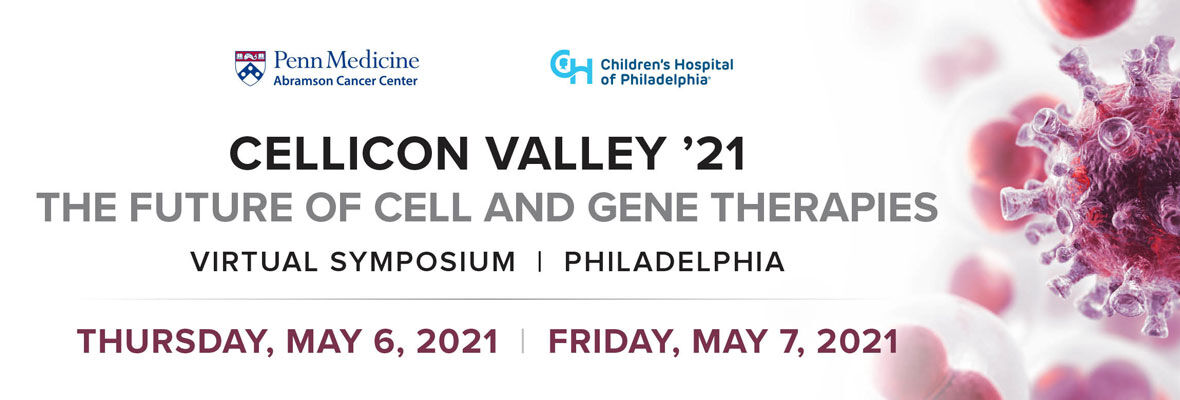Home
View Video* of the Conference
Concurrent Sessions
Day 1 Keynote and Plenary Session
Day 2 Plenary Sessions
*where presenter permission was granted
View Pictures of the Conference
Photographs by Ed Cunicelli
#Cellicon21 #CARTcell
Virtual symposium presented by Penn's Abramson Cancer Center and Children's Hospital of Philadelphia
VIRTUAL SYMPOSIUM
Thursday, May 6 and Friday, May 7, 2021
Overview
As home to the first FDA-approved cell and gene therapies, Penn Medicine and Children’s Hospital of Philadelphia are international leaders who have helped propel Philadelphia into Cellicon Valley, with the University of Pennsylvania ranking 1st among global universities for CAR-T cell patents according to Nature. CAR T represents a turning point in the history of human medicine, a genuine revolution in our approach to disease within the field of cellular therapy and transplant. The approvals of chimeric antigen receptor (CAR) T cells offers even patients with highly chemo-refractory hematologic malignancies additional treatment options. World experts in CAR T-cellular therapy, hematologic malignancies, and hematopoietic stem cell transplantation (HSCT) have been assembled to discuss the development and implementation of this therapy and to weigh in on current applications, best practices, novel strategies and future developments for CAR T cells.
Activity format will provide significant opportunity for interaction with expert faculty and other attendees with the aim of implementing new standards of patient care and understanding new strategies to optimize and improve CAR T cell therapies. Participants will leave with up-to-date, practical information which will have immediate clinical application, and an understanding of critical research initiatives that are rapidly driving this field forward. Research participants will leave with the technical and scientific background on the current state, and where the latest scientific advances may take the field.
Who Should Attend
These activities are intended for both adult and pediatric hematologist-oncologists, medical oncologists, hematologists, hematopathologists, immunologists, immunobiologists, transfusion medicine, researchers, pharmacists, fellows, nurses, nurse practitioners, physician assistants, industry professionals and other healthcare professionals interested in the latest advances in cell and gene therapy. Additionally, patients and their caregivers, family members, advocates and members of the public who may benefit from understanding current innovative approaches to gene and cell therapy are also invited.
Learning Objectives
Upon completion of this symposium, participants should be able to:
- Identify current application of CAR T-cell therapy including: disease indication, accurate patient selection, manufacturing and treatment administration for adult and pediatric patients
- List factors in overcoming resistance to monotherapy CAR’s
- Identify challenges and practice changes in delivery of cell therapy during the pandemic
- Describe the latest targets and technologies for CARs
- Identify the current status of globalization of cell and gene therapies and identify principles in ethics of patient access
- Describe pre-clinical/manufacturing including: target discovery and immunogenicity, viral vector free delivery, gene delivery and editing for more effective therapies
- Identify concepts in next generation clinical research including: newest CARs, novel CARs, Allogeneic CAR-Ts NKs, iPSC's, CAR-T vaccine booster
- Identify standards in regulatory and commercial development related to toxicity management, protocol design
- List advances and challenges in treating solid tumors with cell therapies
- Describe pre-clinical/manufacturing concerns for development of more effective therapies
- Identify concepts in next generation clinical research of cell therapies
- Identify the latest evidence based standards in nursing care resulting from the recent advances in cell therapy and transplant:
• Explain the elements and Sickle Cell disease process and identify existing standard of care treatments for Sickle Cell Disease
• List the steps of identifying and preparing a patient with Sickle Cell Disease for a novel gene therapy
• Identify the core treatment components of a Sickle Cell Disease gene therapy treatment plan
• Describe CAR T trials for pediatric AML
• Describe the population of patients who may benefit from universal CAR T cells
• Describe CAR T trials for Universal CAR T cells
• Repeat the rationale for nursing to remain current with new and upcoming therapies
• Implement COVID Management in the care of liquid oncology patients
• List standards of care and practice for patients preparing for autologous Stem Cell Transplant
• Identify standards of care and practice in the preparation of patients undergoing Allogenic Transplant
• Implement COVID Management in the care of liquid oncology patients
• List the latest updates in immunotherapies for patient with Myeloma Identify late effects and survivorship care following Stem Cell Transplants
within the first year of transplant
For additional information please contact Hyacen Putmon at hyacen.putmon@pennmedicine.upenn.edu.


